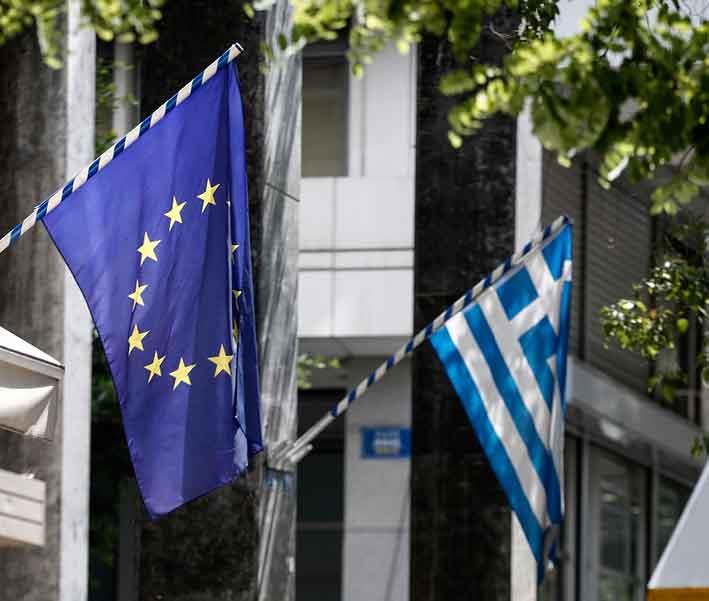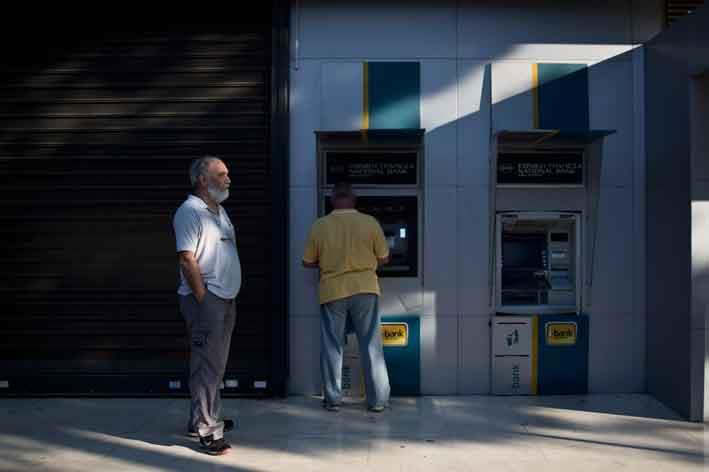Thousands of people have gathered in Athens' main Syntagma Square outside Parliament to demonstrate in favour of a "yes" vote in Sunday's referendum.
Greeks have been called on to vote on whether to accept budget savings that creditors have proposed in exchange for loans. The government has called for a "no" vote.
Police say about 10,000-12,000 people were at today's demonstration, whose main slogan is "We're staying in Europe," before a thunderstorm broke. Many stayed despite the rain.
The protest comes the day after a similar demonstration with about 13,000 government supporters advocating a "no" vote.
Meanwhile, European Union officials say Greece would lose access to more than 16 billion euros ($18 billion) in financial support if its bailout program expires at midnight (2200 GMT).
The officials, who spoke on condition of anonymity because contacts about the program were still ongoing, said three sources of money would disappear in the event of no agreement to extend the bailout.
These include 1.8 billion euros from the EU's financial stability fund, 10.9 billion euros from a Greek bank rescue fund, and a further 3.4 billion euros in central bank profits.

Greece can apply for some other form of assistance, but this could take weeks to organize. In that case, an assessment would first have to be made on whetherGreece is eligible, what kind of terms the new package would function under and the kinds of reforms that Athens would undertake in return.
The prime minister's office says Greece remains at the negotiating table, and that the government has proposed a two-year deal with Europe's bailout fund.
Details over the offer with the European Stability Mechanism, which provides financial assistance to assure the joint currency's financial stability, were sketchy.
However, the prime minister's office said the deal would "fully cover its (Greece's) fiscal needs with the simultaneous restructuring of debt" and that the government "until the end will seek a viable solution within the euro."
The Greek finance ministry says it has posted on its Web page a list of about 1,000 branches of five banks which will open for three days from Wednesday for pensioners without bank cards, who will be able to make a one-time withdrawal of a maximum 120 euros for the week. However, the Web page was down on Tuesday afternoon.
Problems have been reported in the payment of pensions from several funds inGreece as the country struggles in the face of an acute cash crunch.
Tens of thousands of retirees who were due to receive their pensions on Monday had not had the money credited to their bank accounts by the end of the day, although some were being paid on Tuesday afternoon, Greek media reported.
But under Greece's capital controls imposed Monday, the pensioners will only be able to withdraw a maximum 60 euros per day if they have bank cards and just 120 euros this week if they don't. Those that don't have bank cards will have to head to one of the roughly 1,000 bank branches that will open from Wednesday for three days so they can withdraw money.

The European Commission has indicated that an assessment of Greece's overall debt situation and its financing needs could be part of a last-minute bailout deal.
Late Monday, Commission President Jean-Claude Juncker made a last-ditch effort to help Greece get a bailout deal, provided Greek Prime Minister Alexis Tsipras campaigns for staying in the euro.
Beyond accepting proposals made by international creditors last weekend, Commission spokesman Margaritis Schinas said there would be unspecified discussions on Athens's massive debt load, which stood at 317 billion euros ($355 billion) at the end of 2014, or 177 percent of the country's annual GDP.
Juncker had expected an answer on that before midnight Monday, but round noon Tuesday, he was still waiting.
In another development, Greek Finance Minister Yanis Varoufakis confirmed that the country will not make its payment due later to the International Monetary Fund.
When asked while walking out of the Finance Ministry about whether Greece will pay the 1.6 billion euros due to the IMF, Varoufakis said "no."
His comment came amid speculation that Greek Prime Minister Alexis Tsipras is trying to craft some sort of last-minute deal with creditors before the payment is due and before the European part of Greece's bailout comes to an end.
A Greek official said Tsipras has spoken with European Commission President Jean-Claude Juncker, European Central Bank chief Mario Draghi and European Parliament president Martin Schulz.
The official did not reveal what was discussed.
Earlier:
It's crunch time for Greece, with the European part of its international bailout expiring Tuesday and with it any possible access to the remaining rescue loans it contains that it needs to pay its debts.
As a result, the government is unlikely to repay a roughly 1.6 billion-euro ($1.87 billion) debt to the International Monetary Fund due Tuesday, too — a move that increases fears the country is heading to a messy default and potential exit from the euro currency.
With banks shut and Greeks limited to cash withdrawals of 60 euros ($67) per day, long lines formed once more at ATM machines. Capital controls began Monday and will last at least a week, after a weekend bank run prompted by the prime minister's call for a referendum on creditor demands in return for bailout loans.

Prime Minister Alexis Tsipras argues that the demands from creditors for further, tougher austerity measures cannot be accepted after six years of recession.
European officials and Greek opposition parties have warned that a rejection of the creditor proposals in Sunday's popular vote will lead Greece out of the eurozone and potentially out of the European Union itself. The government has responded by saying this is scaremongering, and that a "no" vote will mean the country is in a better negotiating position.
But European Council President Donald Tusk has warned that will not be the case.
The crisis has roiled global markets as investors fret over the repercussions of a Greek debt default and its exit from the euro — developments that could derail a fragile global economic recovery, as well as raise questions over the long-term viability of the euro currency itself.
The Stoxx 50 index of leading shares was down a further 0.8 percent and Germany's DAX down 0.6 percent Tuesday, after recording big losses the previous day. U.S. stocks had their worst day of the year.
In Brussels, European officials said the European Commission chief Jean-Claude Juncker is willing to help give Tsipras a belated way out of his financial crisis if he accepts creditors' conditions on the bailout standoff and campaigns for staying in the euro.

An EU official, who asked not to be identified because of the sensitivity of the talks, called it "a sort of last-minute offer" before Tuesday's dual deadlines.
Under the offer, Tsipras would need to write to Junker and other leaders saying he accept the latest offer which was on the table last weekend. He would also have to change his position on Sunday's referendum.
But there appeared to be scant desire to do that, with numerous officials from Tsipras' radical left Syriza party arguing for a "no" vote on a series of television and radio appearances.
Tsipras himself was defiant in a television interview late Monday, urging voters to reject creditors' demands. More than 13,000 people gathered in Athens to support him and denounce Greece's creditors, as they chanted: "Take the bailout and go!"
"We ask you to reject it with all the might of your soul, with the greatest margin possible," Tsipras said on state television. "The greater the participation and the rejection of this deal, the greater the possibility will be to restart the negotiations to set a course of logic and sustainability."
A protest by supporters of a "yes" vote is planned for Tuesday night.

The government insists that a "no" vote on Sunday will not mean an exit from the euro. Finance Minister Yanis Varoufakis went even further, threatening court action if attempts were made to remove the country from the joint currency.
"The Greek government will make use of all our legal rights," Varoufakis told Britain's Telegraph newspaper.
"We are taking advice and will certainly consider an injunction at the European Court of Justice. The EU treaties make no provision for euro exit and we refuse to accept it. Our membership is not negotiable," he told the paper, in comments released by the ministry.
On the streets of Athens, Greeks began adjusting to the new reality of restricted cash. Pensioners have been particularly hard hit by the capital controls, as many elderly Greeks do not have bank cards and so found themselves completely cut off from their money.
A day after worried elderly Greeks swarmed banks in the hope they would open, the finance ministry said Tuesday morning it would open about 1,000 bank branches across the country for three days this week to allow pensioners without bank cards to make withdrawals. But the limit for them would be set at 120 euros for the whole week, rather than the 60 euros per day allowed for those with bank cards.
Meanwhile, irate depositors called in to television stations to report that some ATMs had run out of 20 euro notes, leaving them dispensing 50 euros only.